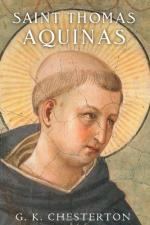|
This section contains 902 words (approx. 3 pages at 400 words per page) |

|
The Dumb Ox Summary & Study Guide Description
The Dumb Ox Summary & Study Guide includes comprehensive information and analysis to help you understand the book. This study guide contains the following sections:
This detailed literature summary also contains Topics for Discussion on The Dumb Ox by G. K. Chesterton.
The Dumb Ox is a biographical sketch of the 13th century Dominican Friar St. Thomas Aquinas. The book is about evenly split between considering St. Thomas' life, and the writings that he produced; however, the author does attempt to combine the two. A large focus of the book is to interest modern readers in St. Thomas, and this is seen very clearly in the opening chapter, "On Two Friars". Chesterton is very aware that readers may be intimidated by, or just uninterested with, the figure of St. Thomas, who is well known as being a very thorough and systematic philosopher and theologian. Therefore, the first chapter is dedicated to associating him with the very vibrant and lovable character of St. Francis, with whom the author hopes the reader is familiar with and fond of.
The book discusses at some length what is known about St. Thomas' early life. St. Thomas was the youngest child of an influential Italian noble family. He was born at a time in which the Holy Roman Empire was waging active war against the Pope, and his family was found torn in their allegiances. St. Thomas had always been a very quiet and reserved individual, so his father arranged for him to enter the Benedictine monastery at Monte Casino. St. Thomas decided to join the Dominican Order instead. The Dominicans, also known as the Order of Preachers, was a new Catholic religious movement dedicated to preaching the Catholic faith. They lived entirely off of voluntary donations. They were a somewhat revolutionary movement in the 13th century, and many people did not have a great esteem for them, including St. Thomas' family. As a result, his decision to join them was met with much opposition, even culminating in his kidnapping and imprisonment. However, he endured all of his family's resistance and remained a member of the Dominicans his entire life.
As a member of the Dominican Order, St. Thomas' first major accomplishment was giving a theological defense of the Friars. Opposition to their movement was growing throughout the Church, and pressure was even being put on the Pope to abolish them. Therefore, St. Thomas dedicated himself to writing a reasoned defense, which was ultimately successful. This defense brought him a certain amount of prestige in the Church, though it would be only the first of many achievements.
His greatest accomplishment, which would consume his entire life, was the promotion of Aristotle's philosophy. By the 13th century, the dominant philosophy of Christianity, a Christianized version of Plato's philosophy, had grown stale, and the Church was having difficulty with a religious movement known as Manicheanism. This was the view that the natural world is evil and dangerous and that in order to live a good life one had to divorce oneself from the world as much as possible. The Church had continually condemned this view, but there was a tendency in Platonic thought that could easily lead to this. Therefore, St. Thomas and his teacher, St. Albert the Great, promoted Aristotelianism, which had a positive view of the natural world, in order to counteract the dangers of Platonism.
Chesterton attempts to give a brief sketch of St. Thomas' adult life. He was a very quiet and very brilliant Friar who, for all the time he spent studying, was deeply devoted to Christ and the Catholic Church. He witnessed and even participated in a number of miracles in the course of his life, many of which confirmed both his holiness and ability to defend the Catholic faith. In addition to being a rigorous thinker, he was also a very skilled poet, as evident in the hymns he composed for the office of Corpus Christi (Latin for "Body of Christ", referring to the Eucharist). At the age of forty-nine, after an unknown spiritual experience which caused him to judge that all of his writings in his life were "straw" compared to what he had seen, he died on the way to the Council of Lyons.
Chesterton gives a brief sketch of St. Thomas' philosophy, but does not treat his theology in any depth. The basic premises of Thomistic philosophy are the affirmation of goodness of Creation and the acceptance of reality as it is. According to St. Thomas' philosophy, everything is good because God has created it, and things are only bad if they are abused. In fact, the natural world is something that is absolutely necessary for man's existence, since all of his knowledge is received through the senses. His philosophy is, finally, something that is incredibly in touch with common sense.
The final chapter of The Dumb Ox attempts to place St. Thomas' work in an historical perspective. Compared with all of the philosophies that came after, Chesterton praises Thomism as the obviously superior and the only practical philosophy. He laments that after St. Thomas' time, Scholastic philosophy—the school of philosophy to which St. Thomas belonged—went largely downhill and very much against the spirit of St. Thomas' work. While St. Thomas had philosophically defeated the Platonic tendency in the Church, after several centuries had passed the Church revived it in the form of the Protestant Reformation which, according to Chesterton, marked the end of the age of Reason and the beginning of the modern era. However, Chesterton is hopeful that the philosophy of St. Thomas will make a return in the modern world.
Read more from the Study Guide
|
This section contains 902 words (approx. 3 pages at 400 words per page) |

|



